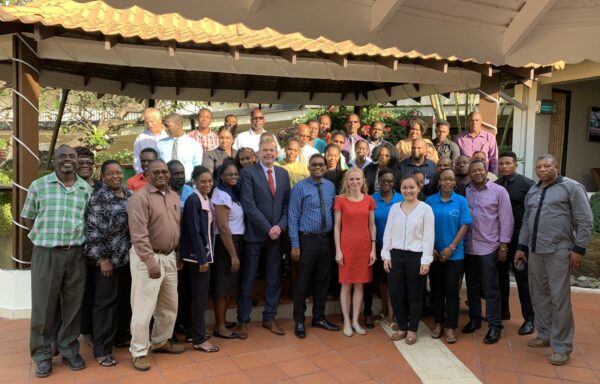Grenada joining the StaTact Process and testing a newly developed web-version of StaTact
Mar 15, 2019
Location

On 13 – 15 March 2019 Grenada has become the first country to use a newly developed web-based version of the StaTact tool during a national workshop organized by UNITAR and UN Statistics Division (UNSD) together with the Central Statistical Office of Grenada (CSO). As a result of the workshop, 6 twelve-month action plans have been developed to address a bottleneck or kickstart a process in such diverse areas as as agricultural statistics, gender-based violence and child abuse, epidemiology surveillance system, education, disaster-related data collection system and environmental statistics.
As many small island developing states, Grenada faces a number of capacity constraints as well as some special issues related to high climate change vulnerability, dependence on blue economy and small populations. In the face of significant data requirements related to monitoring and implementation of the SDGs, Grenada’s CSO has partnered with UNITAR and UNSD to apply StaTact methodology to help make quick progress in a number of critical areas.
The workshop led by Grenada’s Chief Statistician Mr. Halim Brizan and supported by UNITAR and UNSD experts has provided space for discussions by 6 working groups composed of representatives of relevant sectoral ministries, departments and agencies, the statistical office, police as well as other stakeholders such as school principles. It has featured a presentation by Mr. Michael SW Stephen, Comptroller, Inland Revenue Division, Ministry of Finance, has presented Grenada’s National Sustainable Development Plan 2035 (NSDP 2035), and the results of SDG data gaps assessment undertaken by Ms. Kentia Paul, CSO’s SDG focal point. The engagement with working group leaders, the identification of robust measurement issues and of the key stakeholders for these issues have been critical factors leading to the successful outcome of the workshop with 6 action plans agreed by the groups and a very positive feedback on the StaTact methodology. As noted by one of the workshop participants, “StaTact allowed us in a very structured way to “drill” further and within 3 days to clearly identify governance and production process issues and address them with a short-term action plan.”
The StaTact methodology is all about enabling countries to address measurement gaps that impede progress on pressing SDG and other national policy priorities, especially in a short-term timeframe. StaTact provides an analytical framework and a multi-stakeholder methodology to enable teams of national experts from National Statistical Offices, concerned Ministries and other parts of the data community, including non-traditional data sources, to discuss each a selected data issue and design a short-term action plan with a focus on addressing institutional impediments to data collection, production and utilization. The objective is to address bottlenecks they are facing in implementing long-term plans such as National Strategies for the Development of Statistics, National Development Plans or others. The StaTact toolkit is about strengthening data availability and utilization by policy-makers to build stronger and more resilient societies through a better dialogue and collaboration within the National Statistical System and the leveraging of administrative data and other non-traditional data sources such as Big Data.
The tool was developed through pilot testing in the context of three regional workshops held in Bangkok and Addis-Ababa in February-March 2018 and a national workshop in Suriname in June 2018. It was introduced first to UN Member States during the High-level Political Forum on Sustainable development in July 2018, and its new, web-based version was presented to expert statistical community on the occasion of a side event during the 50th session of the UN Statistical Commission in March 2019.
This upgraded, web-based StaTact 2.0 allows the concerned data communities to engage ahead of the workshop using an online Work Group space with a chat function. It also aims to strengthen the follow-up on the action plans by offering a built-in monitoring system. 14 more countries are expected to benefit from StaTact workshops as well as training on monitoring SDGs and compilation of national SDG indicators in 2019 as part of the training programme to strengthen statistical capacities of small island developing states in the Asia-Pacific region.
Want to know more and join the process, visit here: statact.unitar.org
